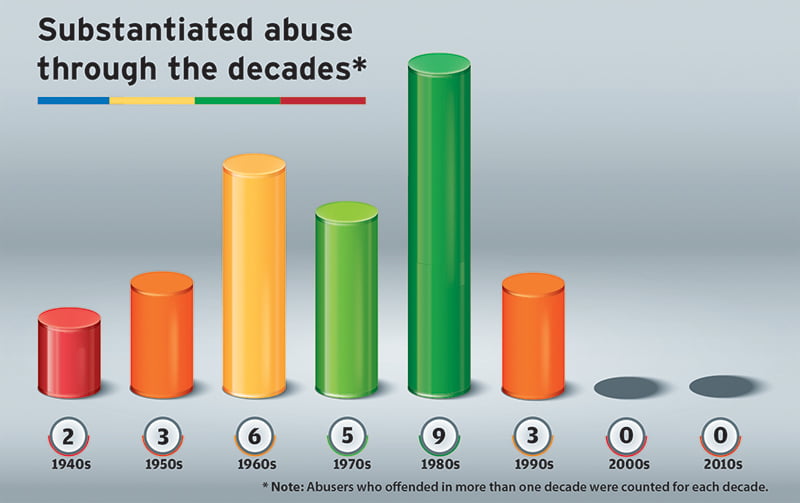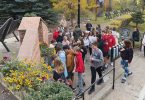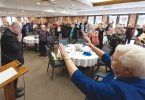
by Joe Bollig
joe.bollig@theleaven.org
KANSAS CITY, Kan. — To provide greater transparency on the part of the church regarding historical allegations of clerical sexual abuse, Archbishop Joseph F. Naumann has released today a list of clerics against whom substantiated allegations of sexual abuse of a minor have been made some time in the last 75 years. None are in current ministry in the archdiocese.
“I thank all victims who have courageously come forward with allegations in order to prevent someone else from being victimized, as well as to assist with the progress of their own healing process,” wrote Archbishop Naumann in his Leaven column.
“I am also grateful to members of the secular press that have brought accusations to light and compelled the church to address this evil in order to promote the healing of victims and protect our children and youth today and in the future,” he added.
The list is composed of the names of 22 clerics against whom substantiated allegations have been made, and four with previously publicized allegations not able to be substantiated. The list was generated by the archdiocese based upon a review of approximately 1,080 individual clergy files dating back more than 75 years by the Chicago office of the law firm of Husch Blackwell.
Those who were not clergy of the archdiocese were either priests of another diocese or members of a religious order assigned to ministry in the archdiocese.
A report based upon the review done by Husch Blackwell was shared with the attorney general of Kansas. If new information comes to the archdiocese, the archbishop said, the list will be updated.
Of the 22 on the list, 10 were priests of the archdiocese. Also, of the 22, 11 are deceased and 7 have been laicized.
The 22 represent 2.04 percent of the 1080 files reviewed by Husch Blackwell.
The archbishop recognizes his responsibility to protect all entrusted to his pastoral care, especially children, and to protect the good names of clerics against the harm of unsubstantiated accusations. Therefore, he has chosen not to include on this list individuals against whom accusations cannot be substantiated at this time.
“When you are attempting to discern the truth of an event that allegedly happened decades ago, this can be very difficult, especially when the accused is deceased and the memories of others, who could have provided helpful information, have faded,” the archbishop wrote. “The list that we are providing today is accurate based on the information we possess at this moment.”
According to archdiocesan policy, the term “sexual abuse of a minor” is not limited to the definitions of sexual abuse under civil or criminal law.
An allegation is considered “substantiated” when it is corroborated with witness statements, documents, emails, photos, texts or by another source, such as law enforcement or the Independent Review Board of the Archdiocese of Kansas City in Kansas. A confession by the accused is not necessary to substantiate a case.
While the publication of this list shines a light on historical allegations, the archdiocese has, since 2003, implemented a substantive safe environment program to help prevent sexual abuse in the church.
This program includes child safety training and criminal background checks for adults, personal safety training for children, and annual safe environment audits of the archdiocese, by an outside, independent firm engaged by the United States Conference of Catholic Bishops. The program also sets out requirements for reporting and investigation.
All adults — clergy, employees, and volunteers — are required to undergo the archdiocese’s safe environment training, Virtus.
Currently, the archdiocese has 18 trained facilitators available to present the Virtus program’s adult awareness training sessions and to date, more than 47,930 adults in the archdiocese have undergone this training. The archdiocese has conducted more than 41,000 background checks for adults serving in any capacity in the archdiocese.
Additionally, the archdiocese has passed every safe environment audit — both remote and on-site — since the audits were instituted in 2004.
Men who apply for seminary studies for the archdiocese must undergo an extensive application process that includes lengthy interviews, multiple references, national criminal background and national sex offender registry checks and a psychological assessment.
Clerics from other dioceses seeking to minister in the archdiocese must present confirmation from their bishop or provincial that they are priests or deacons in good standing.
Allegations of sexual abuse of minors or vulnerable adults are reported to law enforcement and child protection agencies as required by law and the archdiocese’s Child Protection policy. The archdiocese cooperates fully with law enforcement during investigations.
This information is being made available not only in this issue of The Leaven but online here.
Additional answers to frequently asked questions start on page 9 of this week’s issue.







where can I find the 22 names?
Where are the 22 names listed? I did not see them in this article.